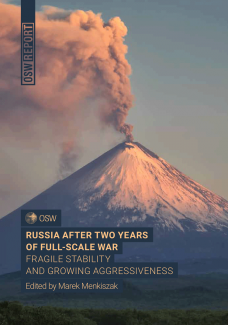Russia after two years of full-scale war

The Putin regime remains stable, but this state of affairs is fragile. The Kremlin has toughened its neo-totalitarian course in domestic policy, its propaganda and government officials depict war as the natural state for both society and the state, and aggressive militarism forms the basis of indoctrination. GDP has grown, driven by war-related spending, but the power of the factors causing this growth have been diminishing. Passing the costs of the war on to business and society may lead to internal tensions. The Russian armed forces have sustained heavy losses during the two years of the invasion, but they still have considerable potential for mobilisation and are in a state of constant expansion, particularly in the western strategic direction. Foreign policy has been subordinated to the immediate goal of transforming Ukraine into a truncated entity with limited sovereignty. At the same time, Russia has moved to destroy the post-Cold War order in Europe & the wider world, and to confront the West head-on. It has stepped up its efforts to secure maximum support from those countries which are in conflict with the West, such as China, Iran and North Korea, and to ensure that countries in the Global South remain neutral. The attitude of the West and the outcome of the war in Ukraine, which may be decided over the next year or so, will be crucial for Russia’s internal stability and its ability to pursue its aggressive external objectives.




